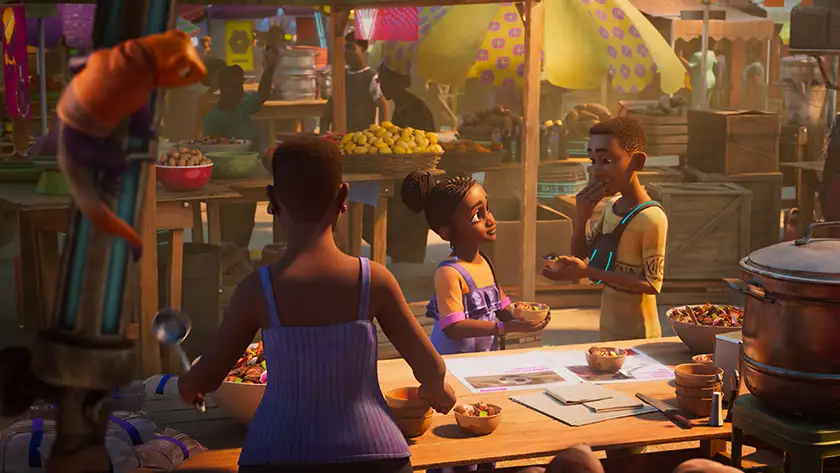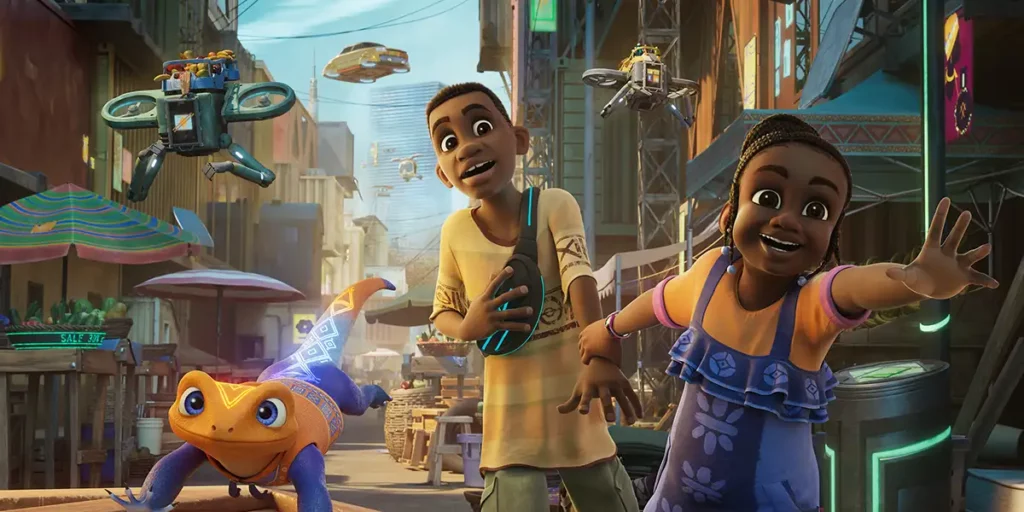Funny, tense, and incredibly well-paced, Iwájú takes us on a journey to futuristic Lagos with each episode of the Disney+ miniseries.
In one of the first episodes of Iwájú, a new animated miniseries on Disney+, the characters talk about how they “want to see the real Lagos.” And that is exactly what the audience experiences too, at least judging from the first three episodes of the series that were shown at the UK Gala Screening. As we delve deeper into the characters’ lives and their adventures, we also get to see what the real Lagos – or at least this futuristic version of Lagos – looks like, something that does not happen often in mainstream media, let alone through the lenses of Disney cartoons.
Iwájú is a coming-of-age story set in a futuristic Lagos, Nigeria. The show follows Toula (Simisola Gbadamosi), a young girl from a wealthy island who has just turned 10 and wants her father to see her as more than just a kid. As the series goes on, Toula seeks to explore the real Lagos and discover the secrets and dangers of the real world outside of the mansion she has grown up in A world where her best friend Kole (Siri Soetan), a self-taught expert who works for Toula’s father, is more than familiar with.
Iwájú was born from a one-of-a-kind collaboration between Walt Disney Animation Studies and the Pan-African Entertainment that aims to put the spotlight on Black media, written and produced by Black people to tell their own story, for the first time in such scale since the release of Black Panther. Nigeria and Lagos are key to this story, thus offering the possibility to explore and distinct feel to the city, with the sense of colour and technology inspired by the real present Lagos. This is all present in the show where audiences get more of more of a glimpse into Lagos as Toula herself starts exploring it.

Iwájú in Yoruba language, one of the official languages of Nigeria, literally means “front- facing” and roughly translates to “the future.” Its very name contains the futuristic science-fiction setting premise of the show. In fact, the whole series fits with the themes and concerns of Afrofuturism. The latter can be described as a cultural aesthetic and philosophy that aims to address themes and concerns regarding Afro-diasporic experiences through speculative fiction and technoculture. As Afrofuturism is often associated with science fiction, such as in this Disney+ series, it becomes an important site for resistance and counter histories to slavery by envisioning a future that speaks to new technologies.
In fact, technology is a key aspect of Iwájú, one that makes the series so unique. As it is set in an unspecified future, in the Disney+ show audiences get to see the new way iGn which technology has become an integral part of the character’s lives. The Disney+ show introduces this very seeminglessly as we see the various ways the characters interact with the technology they have available, which seems to depend a lot based on the social class the characters belong to. The show is also paced very well, with cliffhanger finales to every episode so far, and a striking balance between its comedy and the tension.
Another key theme to Afrofuturism that we can see present in the show is that of liberation as it allows the imagination of a future that is free of hierarchies of race, gender, class, and sexuality. Judging from the first three episodes of Iwájú, there is definitely an intention to question the status quo and explore class divide and its consequences. A lot of the villain’s backstory, masterfully delivered through flashback sequences, is rooted in the economic separation of classes and unequal distribution of wealth and privilege amongst a super rich minority which the series is more than critical of.
With its depiction of new technologies and its own take on Afrofuturism, Iwájú is a fascinating and timely show that audiences will never get enough of, thanks to its excellent pacing and top- notch cinematography. I know that I for one can’t wait to see where Toula’s adventures take her next as the dangers of the city become clearer and more evident halfway through the series.
Iwájú is now available to watch on Disney Plus. Read our review of The Tiger’s Apprentice and the Ted series!

